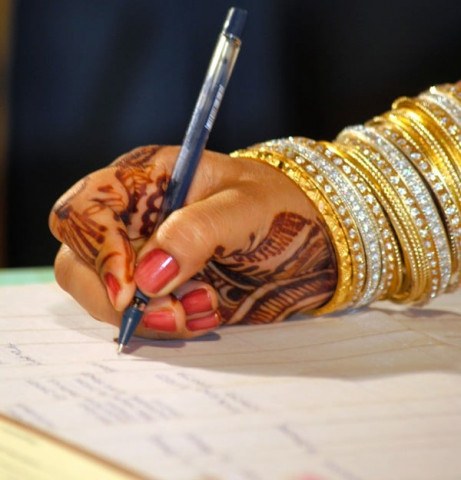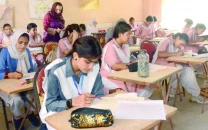Woman wins legal battle after decade proving forged nikahnama
Case raises questions about country's judicial system where 10 years passed merely to establish a document as forged

A woman’s struggle bore fruit after a decade on Friday when Punjab’s top court accepted her stance that the nikahnama (marriage contract) prepared by a man pretending to be her husband was forged as the marriage never solemnised.
The case also raised questions about the country's judicial system where 10 years passed merely to establish a document as forged.
Lahore High Court’s Justice Abid Hussain Chattha, in his detailed judgement, observed that the respondent failed to establish the free consent and will of the petitioner woman with respect to the alleged nikahnama and failed to discharge the burden of proof regarding the registration of a valid and lawful marriage.
Hence, he said, the courts below have grossly misread and non-read the evidence on record and the impugned judgements are not sustainable in view of the law.
The petitioner’s plea is accepted while the impugned judgements handed in by district courts on October 28, 2014, and November 11, 2016, are set aside.
Read more: CII drafting new comprehensive nikahnama
It is clear that the entire episode of the alleged registration of the marriage of the petitioner was surrounded by mystery. It is quite apparent that the nikah was solemnised through a plan and collusive arrangement. In these circumstances, there is no reason to disbelieve the simple story put forward by the petitioner. Had she been actually married and wanted to remarry with another person, she had the option to file a suit for dissolution of marriage in the court instead of filing the instant suit through a concocted story, the judgement added.
It said that the petitioner successfully discharged the burden of proof that nikah had not taken place with her free consent and will, whereafter, the burden of proof shifted upon the respondent to establish her free will and consent to nikah as well as that nikah ceremony had actually taken place.
The judgement said that the place of nikah was not the village where both parties were residing. The absence of the parents of the bride and her relatives was proved without any corresponding reasons for their absence. The witnesses of nikah were the friends of the respondent and were strangers to the petitioner, it said.
The judgement stated the nikah registrar neither knew the petitioner nor had verified her place of abode, adding that the respondent failed to establish his case.
The petitioner’s counsel argued to the court that the impugned judgements passed by the courts below are against the law and facts of the case.
The courts have badly failed to consider that the petitioner did not contract nikah with the respondent and the registration of nikahnama was collusively managed by the respondent in connivance with the witnesses and the nikah registrar as was evident from the surrounding circumstantial evidence which was completely ignored. As such, the impugned judgements are the result of misreading and non-reading of evidence on record, hence, the same is liable to be set aside, it added.
The petitioner had instituted a suit for jactitation of marriage against the respondent (alleged husband) contending that the respondent in connivance with the nikah registrar and other witnesses prepared a forged and bogus nikahnama on March 28, 2012, and started to mention her (petitioner) as his wife, even though, the petitioner never contracted nikah with the respondent.
The respondent was asked to cancel the aforesaid nikahnama and upon his refusal to do so, the petitioner was constrained to file the suit. However, eventually, the family court dismissed the suit on October 28, 2014. An appeal against the family court’s order was dismissed on November 11, 2016.



















COMMENTS
Comments are moderated and generally will be posted if they are on-topic and not abusive.
For more information, please see our Comments FAQ